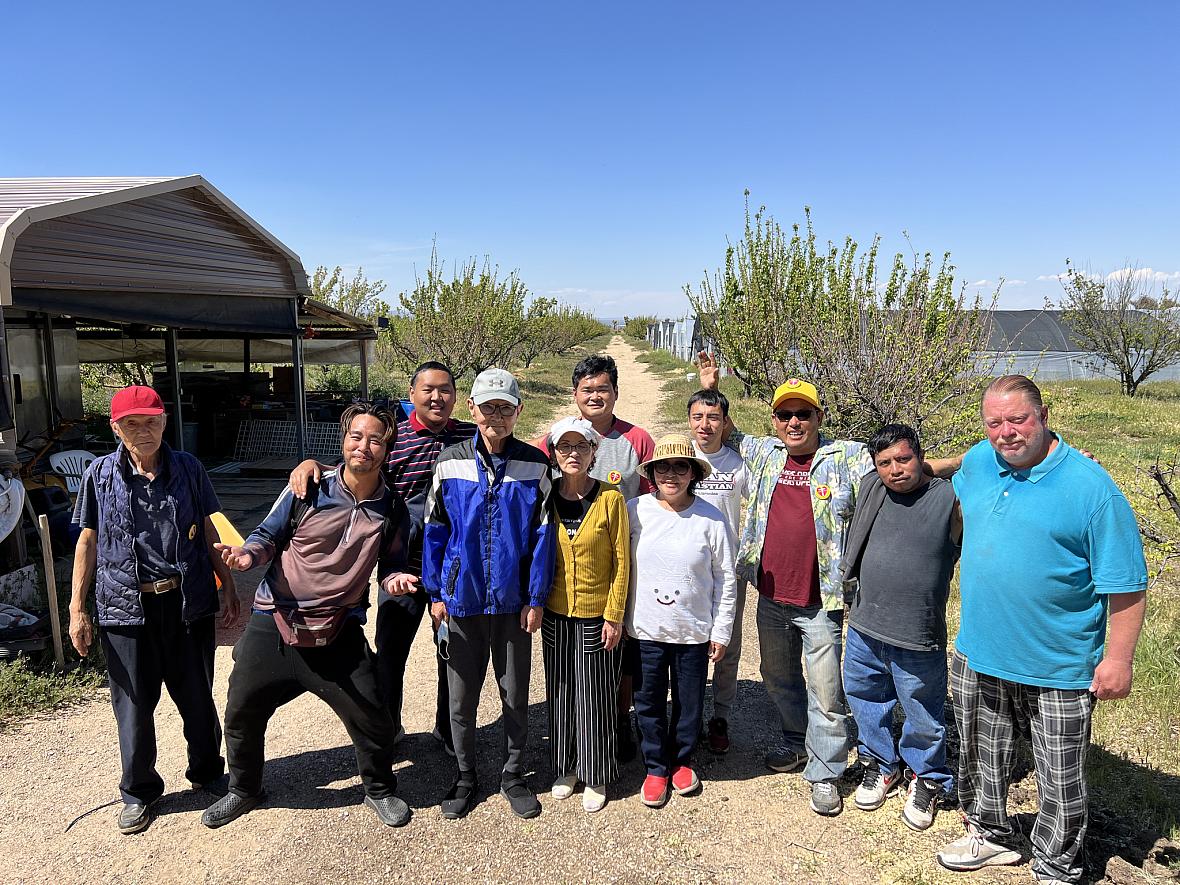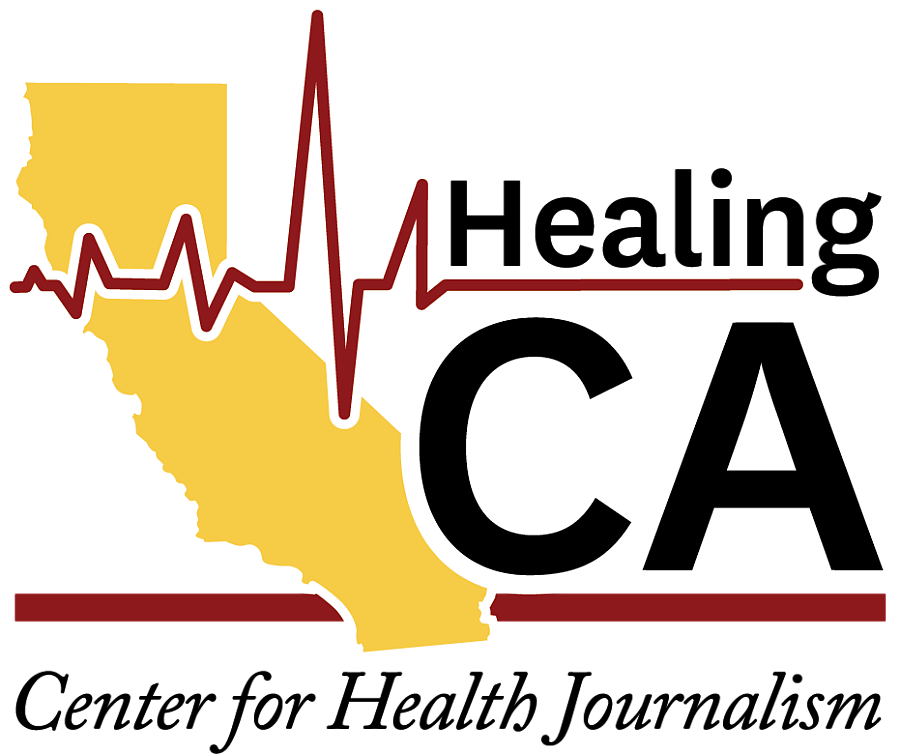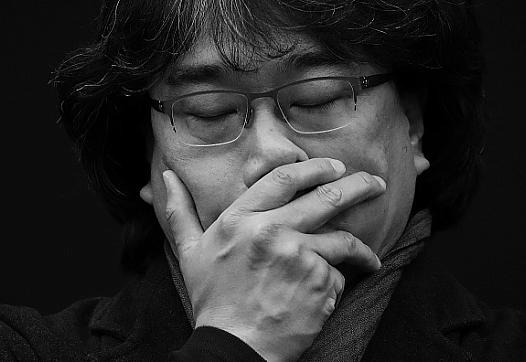Victorville farm — a healing center — offers freedom and hope to the homeless
The story was co-published with The Korea Daily as part of the 2024 Ethnic Media Collaborative, Healing California.

Homeless people and volunteers at Victorville healing center
Hyoungjae Kim, The Korea Daily

About 87 miles from Los Angeles’ Koreatown, there is a farm in Victorville. Around 10 Korean Americans are preparing lunch at the outdoor dining area. Soy sauce-marinated crab and kimchi, brought from Los Angeles, are the specialties on today’s dining table. The people sit around a wooden table. Ranging in age
from their 20s to their 70s, the group includes homeless individuals and volunteers who help them.
It is April 20 at a healing center run by the Father’s Table Mission. After getting off the freeway, it takes about 10 minutes on a dirt road to reach the entrance. About 10 acres in size, the healing center is currently home to about 10 Korean American, Hispanic, and white homeless people to heal their bodies
and minds.
The center offers them free time rather than interference, according to the organization. “When homeless people come here from LA, it creates an environment where they are not tempted to use drugs or drink alcohol. Once they come here, we let them rest and feel nature.”
Pastor Moody Ko of Father’s Table Mission added, “When homeless people who used to live in the inner city of LA come to a farm like this, they sometimes feel alienated from society. They often get frustrated and want to go back to LA. That’s why we help them go back and forth between the shelter in LA and the healing center here.”
Healing the mind and body in nature Homeless people are assigned single rooms. One young man has a bright smile. A Korean American
homeless person surnamed Han, 29, is a second-generation Korean American, who wandered around MacArthur Park and Downtown LA after his mother died. With the help of an acquaintance, he came to the healing center and said his mental health has improved since. He welcomed calls from his father in LA.
David Oh, in his late 20s, had been homeless for four years, living in San Francisco and Los Angeles, and had developed a severe drug addiction with methamphetamine. For seven months, he has been in rehabilitation, bouncing back and forth between the Father’s Table Mission’s Los Angeles shelter and the Victorville healing center. “It’s bearable,” Oh said and smiled, now that he stopped using drugs.
“Even when I was sleeping on the street, there were people who fed me. The hardest part was when it was raining and cold. I made a lot of friends here, and I like it. I wish they could keep people off the streets because once someone gets hooked on drugs, it’s really hard to get off.”
Ko, a member and volunteer at Father’s Table Mission, has been helping the homeless in Los Angeles since 2008, for 16 years. As the number of Korean Americans experiencing homelessness has significantly increased, Father’s Table Mission has opened its church in Koreatown at 2551 W Olympic Blvd as a shelter.
The shelter has about a dozen bunk beds to house nearly 30 homeless people, including Korean Americans.
With the support of Korean American benefactors, the church purchased a $650,000 Victorville farm as a healing center for the homeless. [Courtesy of Father’s Table Mission Support from Korean-American benefactors In 2022, Father’s Table Mission Church built the Victorville healing center, costing about $650,000 at the time, with the help of church members, supporters, and benefactors. The church uses the facility to help
rehabilitate and rebuild the lives of the homeless.
Gloria Choi, 43, from Musan, North Hamgyeong, North Korea, said her heart has healed during a year-long stay at the Father’s Table Mission’s LA shelter and the Victorville healing center. In 2005, Choi defected from North Korea to settle in South Korea, where she married. In October 2018, she came to the United States for her son’s education. However, during the pandemic, her wholesale business importing clothes from China to Los Angeles went under.
“I was bringing clothes from China and delivering them to stores in LA, but the money started to stop coming in. I worked hard and it was really hard to accept it. I was thrown out on the streets and left my son with a friend. I was sick for eight months with severe depression.”
Facing financial hardship and public shunning due to a failed business, Choi found solace at the Father’s Table Mission. “The healing center has a nice natural environment,” she said. “What homeless people need most is a place to feel home. As I got better, thanks to the comfortable environment here, I want to help new people who come to the center.”
Specialized help is needed
The healing center is a large farm. The main building, warehouse, garage, kitchen, and a greenhouse used as a common room are the facilities for homeless people. They achieve a sense of accomplishment as they tend to the 600 plum trees and 10 greenhouses on the farm. The greenhouses are planted with vegetables favored by Koreans, such as perilla leaves, lettuce, and green onions.
Recently, they also built an animal barracks, where they raise five goats, 15 chickens, 10 ducks, and five rabbits. However, it lacks professional program development and staff to systematically manage the huge farm with the healing center.
“The plum harvest was ruined this year due to a sudden cold wave in spring,” said Ko, adding, “The farm itself can be a rehabilitation space and workplace for the homeless. If we take good care of the plum trees and increase the number of livestock, they can even generate income.”
Ko and the volunteers hope that the healing center will become a place where homeless people can get help to transform themselves. This is why they welcome anyone who is willing to stay at the center. “In the last three years, two Korean Americans we helped have lost their lives to fentanyl overdoses.
There is a lack of customized support for minorities, including Korean American, Mongolian, and Chinese homeless people. Those who became homeless for economic reasons can get back on their feet with just six months to a year of room and board. I wish our community would come together to create more community-oriented shelters.”
This project is supported by the USC Annenberg Center for Health Journalism, and is part of “Healing California,” a yearlong reporting Ethnic Media Collaborative venture with print, online and broadcast outlets across California.
